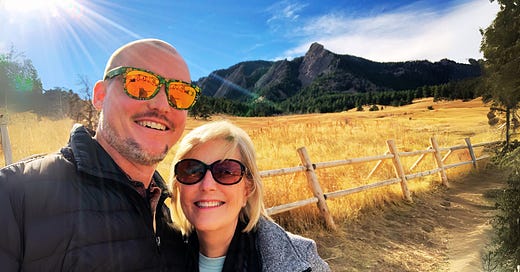3 Ways You Can Suffer Less, According to My Mom
Here's her compassionate wisdom for finding your inner peace.
This is Mom. She’s my guru.
Her seeds of wisdom have informed my life unfathomably, and much of what you read in these newsletters are the fruits of her nurturing.
She loves deeply. Gives generously. Supports selflessly. Embraces compassionately. Laughs infectiously. Guides silently.
And I want you to experience her insights, too.
I asked her: “If someone sought your guidance about identifying—and stopping—their suffering, what would be your top three recommendations?”
Here are her replies; her wisdom soul food.
I hope you find solace in them as well, wherever you are in your journey.
Mom’s To-Do List for Suffering Transformation
1. Hold Compassionate Space for Yourself
Holding compassionate space for yourself is fundamental for prompting and maintaining personal growth and supporting your psychological well-being.
When you foster internal acceptance instead of judgment, you permit yourself to process difficult emotions, acknowledge your humanity, and heal emotional wounds. Responding to your needs with kindness instead of criticism also fortifies your resilience, expands your capacity to extend compassion to others, and serves as the foundation for authentic living.
Here are Mom’s suggestions for cultivating self-compassion:
Check in with yourself daily, even if for a few seconds.
Place a hand on your heart at different points to connect physically with your compassion.
Notice your internal dialogue. Replace harsh self-criticism with the same gentle tone you'd use with a close friend.
Acknowledge difficulties with phrases like "This is hard" or "I'm struggling right now."
In all situations, practice self-forgiveness. Pat yourself on the back for your successes, but also remember that mistakes are universal human experiences, not personal failings.
2. Have the Courage to Embark on a Self-Inquiry Journey
Self-inquiry is fundamental to authentic and purposeful living. But looking at yourself through a magnifying glass is also uncomfortable.
However, doing so eventually enables you to make choices aligned with your needs rather than unconscious programming. It also illuminates blind spots that can sabotage your well-being, leading to more meaningful relationships, greater work satisfaction, and an increased sense of fulfillment.
Here are some of her suggestions for sharpening the tool of self-inquiry:
Pause three times each day, take three breaths each time, and ask, "What am I feeling right now?" This establishes the habit of turning your attention inward.
When you experience intense reactions to situations, record them in a “pattern journal.” The Notes app on your phone is probably the easiest. Review weekly. This helps you develop greater insight into why you react in different ways, which uncovers deeper motivations and needs.
Observe your thoughts for 2 minutes each day, but don’t identify with them. This helps you recognize that you are not them, but the awareness of them, which is a fundamental perspective shift that’s essential for deeper self-inquiry.
The work isn't glamorous. But over time, these small moments of attention peel away the layered stories you've told yourself about who you’re expected to be. Speaking of which…
3. Contemplate the Question “Who am I?”
Mom offers this quote from Rupert Spira’s The Ashes of Love as a signpost for uncovering who you are:
“First, we imagine an Ego, then defend it, then express it, then fulfill it, then try to get rid of it, then welcome it, then understand it, and finally see that it is non-existent at all times.”
In other words, when you mindfully recognize your ego—the accumulation of personal, social, professional, familial, moral, and spiritual identities that collectively create “you”—you regain the power to release its pre-conditioned narratives.
Then, your unbound authenticity remains, transforming your relationship with suffering and shifting your life’s perspective.
To help cultivate ego-recognition, Mom suggests pausing and taking three conscious breaths when faced with stress, frustration, or even boredom. Then:
Ask yourself, "Who is experiencing this right now?"
Don't analyze intellectually. Instead, direct your attention to the split-second awareness before your thoughts arise.
Recognize that whatever you're experiencing (an emotion, sensation, thought) is happening to "someone." But who exactly is this someone?
Rather than trying to define yourself, simply feel your presence, free from all labels and self-sustained stories.
She says that practicing these can increasingly reveal the spaciousness beneath the surface of your constructed identity and help you better understand who you fundamentally are.
“Here’s the Wisdom I Told You About, Dear. From Mom, with Love”
Mom's insights remind us that suffering usually stems from how we relate to our experiences—and perhaps more importantly, ourselves—rather than the experiences themselves.
But by cultivating self-compassion, you create a foundation for healing.
Through self-inquiry, you crack open the patterns keeping you trapped in cycles of suffering.
And by questioning your fundamental identity, you discover the spaciousness beyond your ego-driven narratives.
I am endlessly grateful to you, Mom, for being my foundation, role model, and guru.
Thank you for shining your light brightly. And for helping me remember mine.
May your wisdom carry others as far as it has me.





Nice to see your mother. She's just as beautiful as you. She looks a lot like you. I love the sun rays in the photo. I've never read Rupert Spira’s The Ashes of Love. Thanks for the book recommendation. What a lovely tribute to your mother.
These are super helpful ways to become mindful and they are simple to try. Thanks for sharing I just subscribed for more.